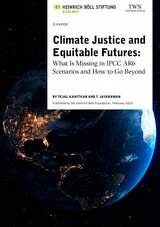Climate Justice and Equitable Futures
This policy brief unpacks how and why the scenarios and models of the Sixth Assessment Report of the IPCC project climate action pathways that lead to unacceptable futures. These pathways restrict well-being for the majority of the world’s population and lead to a world with perpetual global inequalities in income, consumption, and energy use, while increasing the number of people exposed to the risk of hunger and endangering food security. The paper also demonstrates the possibility of alternate perspectives and outlines what must change in the preparation of the Seventh Assessment Report of the IPCC in order to foreground equitable futures that ensure climate justice and the well-being of all.
Product details
Table of contents
Abbreviations
Abstract
«Global modelled pathways» in the IPCC's AR6
Projecting Inequitable Futures
Why do scenarios project unequal futures?
- GDP and Consumption of Goods and Services
- Primary Energy Consumption
- Fossil Fuel Consumption
- Carbon Sequestration from Land Use and Carbon Capture and Storage
- Food Security and the Risk of Hunger, and the Sustainable Development Goals
- Near-term Reductions in CO2 Emissions
- Sharing the Remaining Carbon Budget
Pervasive inequalities in the IAMs and scenario frameworks
Are the IPCC scenarios representative?
Are scenarios that ensure both equity and climate compatibility possible?
- Equitable distribution of the mitigation burden
- A sustainable future for all
The way forward for AR7
References
The authors
